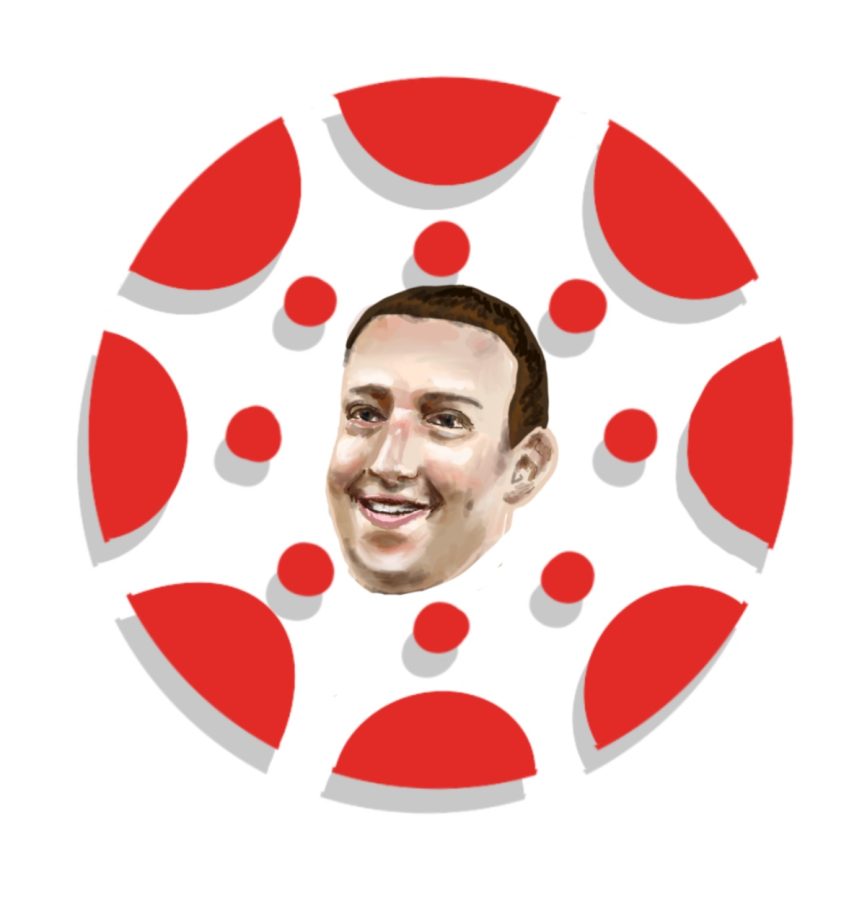Canvas rebrands to “Zeta” with augmented reality
WELCOME TO THE ZETAVERSE: Muckerberg’s dream for the education tool Canvas may soon become our (augmented) reality.
January 13, 2022
C.E.O. of former Bookface Zuck Muckerberg announced a $15.99 deal with Instructure in which popular learning tool “Canvas” will be transferred to Muckerberg’s company Meta and rebranded to “Zeta.”
The move, officially announced in a pixelated Bookface live press conference on Nov. 1, comes just days after a massive black market of illegal assignment trading and data-leaking was exposed within Canvas’ software.
Documents published by internal whistleblowers revealed that malicious teachers were bribing students with answer keys under the disguise of discussion post replies to collect personal data on fellow classmates. This data was found to be transmitted to school officials, who used it to sabotage PTSA elections, as well as to the government in order to screen for dangerously free-thinking students.
“It was heartbreaking to discover through our stolen records of text histories that students’ information was being leaked in such a barbaric way,” Muckerberg said at the press conference. “By embracing this revolutionary new name, we hope that the media will conveniently forget about all such controversies.”
Zeta has indicated plans to implement the “Zetaverse,” an augmented-reality virtual world in which students learn as online avatars. Teachers will be able to design their own virtual classroom using Muckerberg’s framework and have complete freedom over lesson plans (as long as they include a unit on Muckerberg’s success and fame with Bookface).
“I envision a future in which billions of students enter the Zetaverse on a daily basis,” head of Zeta’s non-education department Deyt A. Leek said. “Posting discussion replies virtually in the US. Senate, completing 3-dimensional Google Doc assignments or even hearing announcements through loudspeakers at a virtual Kanye West concert: The possibilities are endless!”
The Zetaverse has also been designed specifically to address issues with stress and depression among students. Personalized algorithms will adapt to remove classes in which students are struggling, and students will have the option to block teachers or fellow students they dislike at any time. Zeta will also be made as addicting as possible so that students can hide from their problems in the real world.
“The idea is that students will live the rest of their lives in the Zetaverse, safe in our hands,” Muckerberg said. “It’s long been said that education should be personalized, and what better way to personalize it than by controlling it?”
At the same time, Muckerberg has indicated that he wishes to avoid fiascos like the Canvas black market controversy from reoccurring, so he will routinely collect data on student’s everyday interactions, movements and even thoughts through Zeta to make sure that the data can not be stolen by any other third party. This expensive system will be funded by advertisements, so students should not be surprised if they get a 30-second ad every time their teacher finishes a sentence.
Unfortunately, in spite of these great strides for education and safety, it’s nearly inevitable that problems will eventually arise with the new application. In case something particularly catastrophic occurs, Zeta’s board of non-education is prepared to rebrand the education app to the unique, never-before-seen name “Reta.”


























































